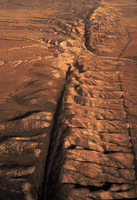 South San Andreas fault set for huge quake: study
South San Andreas fault set for huge quake: studyBy Deena Beasley and Jeremy Lovell
LOS ANGELES/LONDON (Reuters) - The southern end of the San Andreas fault near Los Angeles, which has not had a major rupture for more than 300 years, is under immense stress and could produce a massive earthquake, a new study said on Wednesday.
But exactly when that quake will take place cannot be predicted, the scientist who conducted the study published in the British journal Nature said in an interview with Reuters.
"The fault is accumulating stress at a high rate, but this does not suggest that a rupture is imminent," said Yuri Fialko, of the Scripps Institution of Oceanography at La Jolla, California. "When the quake will happen nobody knows."
His study found that, given average annual movement rates in other areas of the fault, there could be enough pent-up energy in the southern end to trigger a cataclysmic jolt of up to 10 meters (33 feet).
"This is new evidence that tells us the same story that we have known for a while," said Scott Brandenberg, a professor at the University of California, Los Angeles school of engineering. "It's a reminder that we need to be ready for it when it happens."
Fialko said his data taken by satellite is more complete than previous studies because measurements were taken every 20 meters (66 feet) instead of at ground stations 10 kilometers (6.2 miles) apart.
"The observed strain rates confirm that the southern section of the San Andreas fault may be approaching the end of the interseismic phase of the earthquake cycle," he wrote in the science journal Nature.
A sudden lateral movement of seven to 10 meters (23 to 33 feet) would be among the largest ever recorded.
'BIG ONE'
According to the U.S. Geological Survey (USGS), the earthquake that destroyed San Francisco in 1906 was produced by a sudden movement of the northern end of the fault of up to 21 feet.
Fialko said there had been no recorded movement at the southern end of the fault -- the 800-mile--long geological meeting point of the Pacific and the North American tectonic plates -- since the dawn of European settlement in the area.
He said this lack of movement correlated with the predicted gaps between major earthquakes at the southern end of the fault of between 200 and 300 years.
"The longer you wait, the higher the likelihood of rupture," the Scripps scientist said.
Ken Hudnut, a scientist at the USGS, said experts have known since 1988 that the southern section of the San Andreas fault is the most likely source of a "Big One."
"We think recurrence is on a level of a few hundred years and the last one was a few hundred years ago, but we don't understand earthquakes well enough to predict when they will happen," he said.
Fialko's study found that elsewhere on the fault there were average slippage rates up to a couple of centimeters (0.8 inch) a year that prevented the build-up of explosive pressure deep underground.
When these became blocked and then suddenly broke free they produced tremors or earthquakes of varying intensity depending on the movement that had taken place before and the duration of the blockage.
Yesterday I had lunch with an artist friend from my church, and we laughed together about all kinds of things. She and her husband lived in southern California for a while several years ago, and when they moved back to the Des Moines area, they attended a church whose building was on the southern edge of the city's airport. She said that whenever she'd be sitting in church on a Sunday morning and a jet would take off, it had the same sound and feel that occurred when an earthquake was starting, and she would automatically clench her buttcheeks together in preparation.
I have done a zillion tornadoes and even a hurricane (Hurricane Allen, 1980), but I have never experienced an earthquake, even though I have visited LA and SanFran several times. I suppose that's probably something I should be thankful for, but I'm the kind of person who likes to have experiences. I'll even get myself lost somewhere on purpose just so I can find my way out and know my way around... or get myself in trouble, just to know what it felt like to do the thing I wasn't supposed to do. [grin] Dunno what that means; either I'm too stupid to rely on others' experiences, or I just have an insatiable thirst for knowledge. Probably a bit of both.

No comments:
Post a Comment